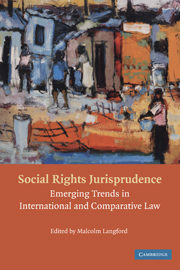Book contents
- Frontmatter
- Contents
- Foreword – Philip Alston
- Preface
- PART ONE OVERVIEW
- PART TWO SELECT NATIONAL JURISDICTIONS
- 4 South Africa
- 5 India
- 6 South Asia
- 7 Colombia
- 8 Argentina
- 9 Brazil
- 10 Venezuela
- 11 Canada
- 12 The United States
- 13 Hungary
- 14 France
- 15 United Kingdom
- 16 Ireland
- PART THREE REGIONAL PROCEDURES AND JURISPRUDENCE
- PART FOUR INTERNATIONAL HUMAN RIGHTS PROCEDURES AND JURISPRUDENCE
- PART FIVE SPECIAL TOPICS
- Notes on Contributors
- Table of Authorities
- Index
- References
4 - South Africa
Adjudicating Social Rights Under a Transformative Constitution
Published online by Cambridge University Press: 05 June 2012
- Frontmatter
- Contents
- Foreword – Philip Alston
- Preface
- PART ONE OVERVIEW
- PART TWO SELECT NATIONAL JURISDICTIONS
- 4 South Africa
- 5 India
- 6 South Asia
- 7 Colombia
- 8 Argentina
- 9 Brazil
- 10 Venezuela
- 11 Canada
- 12 The United States
- 13 Hungary
- 14 France
- 15 United Kingdom
- 16 Ireland
- PART THREE REGIONAL PROCEDURES AND JURISPRUDENCE
- PART FOUR INTERNATIONAL HUMAN RIGHTS PROCEDURES AND JURISPRUDENCE
- PART FIVE SPECIAL TOPICS
- Notes on Contributors
- Table of Authorities
- Index
- References
Summary
INTRODUCTION
The 1996 South African Constitution is renowned internationally for its holistic, inclusive Bill of Rights. In addition to traditional civil and political rights, the Bill of Rights includes a comprehensive set of social, economic and cultural rights. All these rights are enforceable by the courts, and the courts have a wide discretion to grant ‘just and equitable’ remedies.
This chapter discusses the history and background of the inclusion of socio-economic rights in the 1996 Constitution, and the evolving jurisprudence on the enforcement of these rights. This jurisprudence illustrates how the South African courts are developing a principled and pragmatic model for the judicial review of socio-economic rights, which supports the transformative goals of the Constitution. Some of the main critiques of certain aspects of the courts' jurisprudence are also discussed.
INCLUDING SOCIO-ECONOMIC RIGHTS AS JUSTICIABLE CONSTITUTIONAL RIGHTS
The inclusion of socio-economic rights as fully justiciable rights in the Bill of Rights was the subject of extensive academic and public debate and contestation. This debate must be viewed in the context of the transition from a system of parliamentary sovereignty through which the apartheid system was enacted to a constitutional democracy. A critical objective of the Constitution is that it facilitates the transformation of South African society. Key elements of this transformation include the dismantling of a plethora of racist and sexist laws and institutions, redressing their legacy, healing the divisions of the past and building a new society committed to social justice and the improvement in the quality of people's lives.
- Type
- Chapter
- Information
- Social Rights JurisprudenceEmerging Trends in International and Comparative Law, pp. 75 - 101Publisher: Cambridge University PressPrint publication year: 2009
References
- 5
- Cited by



